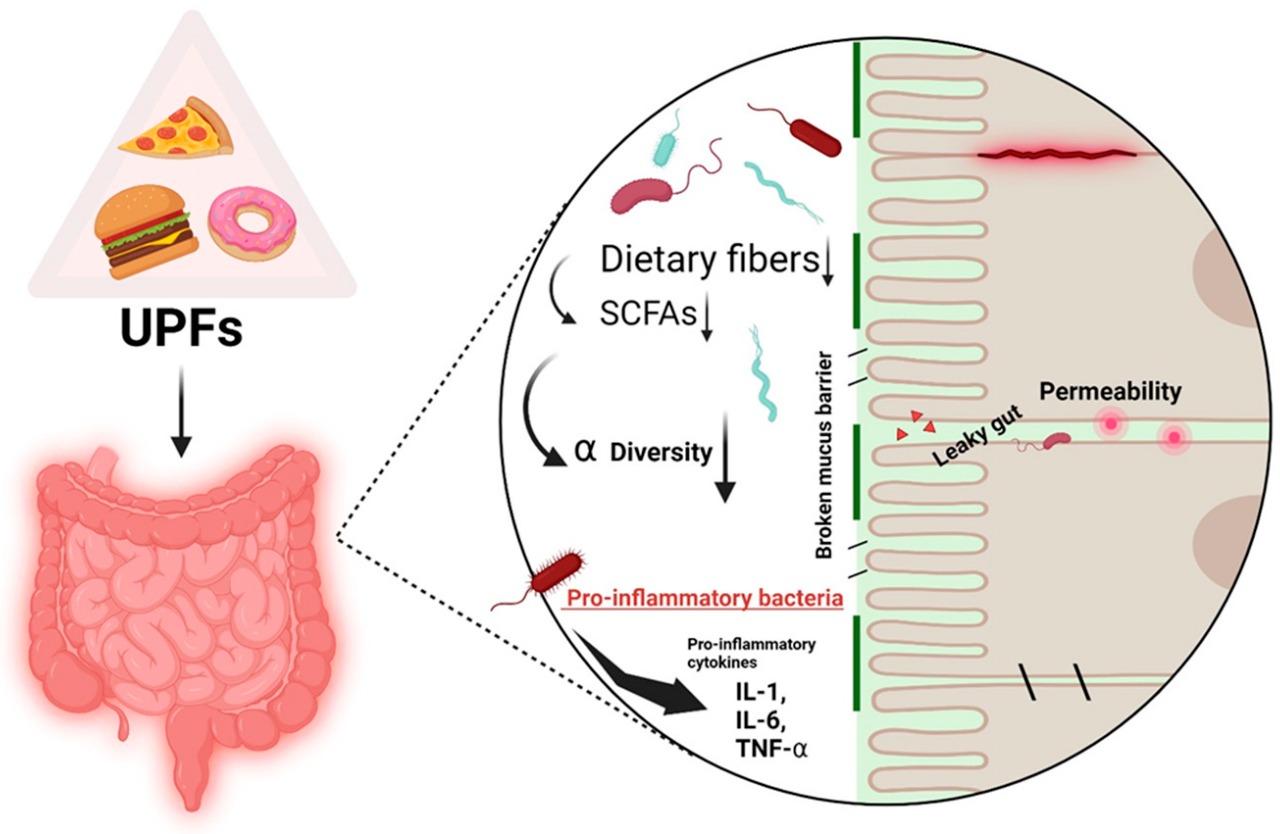As convenience-driven diets dominate modern lifestyles, a growing body of research is sounding the alarm on ultra-processed foods and their devastating impact on gut health. A new study published in Cell Metabolism and reviewed by the American Heart Association reveals that even small amounts of ultra-processed foods—commonly found in packaged snacks, sugary beverages, and ready-to-eat meals—can disrupt the gut microbiome, increase intestinal permeability, and trigger chronic inflammation.
The findings come amid rising rates of obesity, type 2 diabetes, and gastrointestinal disorders, prompting experts to call for urgent dietary reforms and stricter food labeling regulations. While ultra-processed foods are engineered for taste, shelf life, and affordability, their long-term effects on digestive and metabolic health are proving far more costly.
Key Highlights From Recent Studies
- Ultra-processed foods (UPFs) reduce microbial diversity and suppress beneficial gut bacteria
- Emulsifiers and additives in UPFs damage the intestinal barrier, leading to leaky gut syndrome
- UPFs promote the growth of pro-inflammatory microbes linked to chronic diseases
- Gut dysbiosis caused by UPFs may contribute to mood disorders and cognitive decline
- Even with equal calorie intake, UPFs lead to greater fat accumulation and hormonal disruption
Microbiome Disruption: The Hidden Cost Of Convenience
The gut microbiome—a complex ecosystem of trillions of microorganisms—plays a vital role in digestion, immunity, and mental health. Diets high in UPFs have been shown to reduce microbial diversity, a key marker of gut resilience. Beneficial bacteria such as Akkermansia muciniphila and Faecalibacterium prausnitzii, known for their anti-inflammatory properties, decline sharply with regular UPF consumption.
This imbalance, known as gut dysbiosis, favors the proliferation of harmful microbes that produce endotoxins and inflammatory compounds. Over time, this can lead to systemic inflammation, insulin resistance, and increased susceptibility to infections.
Intestinal Barrier Breakdown: The Leaky Gut Link
The intestinal barrier regulates the passage of nutrients and prevents toxins from entering the bloodstream. UPFs compromise this barrier through chemical additives like carboxymethylcellulose and polysorbate 80, which erode the protective mucus layer and disrupt tight junctions between cells.
This condition, often referred to as leaky gut, allows pathogens and undigested food particles to leak into circulation, triggering immune responses and inflammation. Researchers have linked this phenomenon to autoimmune disorders, irritable bowel syndrome, and even skin conditions like eczema.
Metabolic And Hormonal Fallout
A recent clinical trial involving healthy young men found that participants on a UPF-rich diet gained more fat mass than those on a minimally processed diet, despite consuming the same number of calories. The study also reported disruptions in hormone levels, including insulin and testosterone, suggesting that UPFs interfere with endocrine function.
These effects are compounded by the presence of packaging contaminants such as bisphenols and phthalates, which leach into food and further impair metabolic health.
Gut–Brain Axis: Mental Health Implications
Emerging evidence suggests that UPFs may also affect the gut–brain axis, a bidirectional communication pathway between the digestive system and the brain. Alterations in gut microbiota have been linked to anxiety, depression, and cognitive decline. The lack of dietary fiber and presence of synthetic additives in UPFs may impair neurotransmitter production and reduce neuroprotective compounds.
What You Can Do
- Replace UPFs with whole foods rich in fiber, such as fruits, vegetables, legumes, and whole grains
- Incorporate fermented foods like yogurt, kefir, kimchi, and sauerkraut to support microbial diversity
- Read ingredient labels and avoid products with long lists of additives and preservatives
- Limit consumption of packaged snacks, sugary drinks, and processed meats
- Support policy changes that promote transparent labeling and restrict harmful additives
Health Outlook: A Gut-Friendly Future Starts With Your Plate
Ultra-processed foods may offer short-term convenience, but their long-term impact on gut health is profound and far-reaching. As research continues to uncover the links between diet, microbiota, and chronic disease, the message is clear: protecting your gut starts with choosing real, minimally processed foods. The shift may be quiet, but its benefits are anything but.
Sources: Cell Metabolism, Times of India, MSN Health, American Heart Association, University of Copenhagen NNF Center for Basic Metabolic Research

